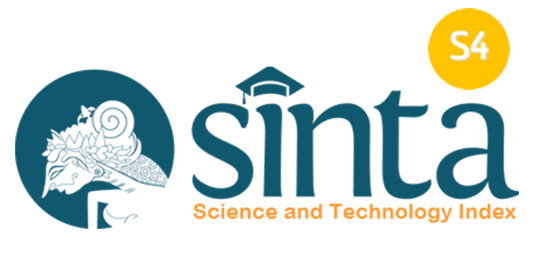THE EFFECT OF THERAPEUTIC GROUP THERAPY ON THE DEVELOPMENT OF ADOLESCENT SELF IDENTITY IN ORPHANAGE
Downloads
Introduction: Adolescents living in orphanages experience a lack of self-confidence, withdrawal, lack of interest in learning, lack of communication, and a closed attitude so that it will have a negative impact on cognitive, emotional, and social development. This study aims to determine the effect of Therapeutic Group Therapy (TKT) on the development of adolescent self-identity in orphanages. Methods : The study design was a Quasy experimental pre-post test control group design. The population was 104 children living in orphanages A and B. The research sample was 30 intervention groups and 32 control groups that met the inclusion criteria obtained through purposive sampling. The independent variable is Therapeutic Group Therapy while the dependent variable is self-identity. Data obtained using a questionnaire and analyzed using the Wilcoxon Sign Ranks Test and Mann-Whitney U Test with a significance level ∔ <0.05. Results : The results of the analysis of the intervention group showed the effect of TKT on self-identity (p = 0.0001). The results of the Mann-Whitney U Statistical Test of self-identity test showed a value of p = 0,0001 ( ∔ <0.05) meaning that there was an effect of TKT on self-identity between the two groups. Conclusion : TKT is done by health workers can help identify identity status teenagers and can improve self-identity teenager who lived in the orphanage through health education.
Ahmad, A., Qahar, J., Siddiq, A., Majeed, A., Rasheed, J., Jabar, F., & von Knorring, A.-L. (2005). A two-year follow-up of orpahns' competence, socioemotional problems and posytraumatic stress symptoms in traditional foster care and orphanages in Iraqi
Kurdistan. Child Care and Health Development, (McKenzie 1998), 203–215. Retrieved from http://swepub.kb.se/bib/swepub:oai:DiVA.org:uu-26221
Ali, M., & Asrori, M. (2018). Psikologi Remaja (Perkembangan Peserta Didik) (13th ed.). Jakarta: PT. Bumi Aksara.
Bahari, K., Keliat, B. A., & Gayatri, D. (2010). Pengaruh Terapi Kelompok Terapeutik terhadap Perkembangan Identitas Remaja di Kota Malang.
insos Kab.Mojokerto. (2018). Jumlah LKSA dan Kelayanan yang Ditangani Kabupaten Mojokerto 2018. Mojokerto: Dinas Sosial.
Erikson, E. H. (1968). Erikson. Identity, youth and crisis. New York: WW Norton Company.
Hatano, K., Sugimura, K., & Crocetti, E. (2016). Looking at the dark and bright sides of identity formation: New insights from adolescents and emerging adults in Japan. Journal of Adolescence, 47, 156–168. https://doi.org/10.1016/j.adolescence.2015.09.008
Hockenberry, M. J., & Wilson, D. (2018). Wong's nursing care of infants and children-E-book. Elsevier Health Sciences.
IDAI. (2013). Masalah Mental Emosional Remaja dalam Bunga Rampai Kesehatan Remaja. Badan Penerbit Ikatan Dokter Anak Indonesia: Jakarta, 62–75.
Kementerian Kesehatan RI. (2013). Menkes: Remaja Indonesia Harus Sehat. Retrieved October 23, 2018, from http://www.depkes.go.id/article/view/18051600001/menkes-remaja-indonesia-harus-sehat.html
Kementerian Sosial RI. (2006). Data Kesejahteraan Sosial. Retrieved October 22, 2018, from https://www.kemsos.go.id/content/data-kesejahteraan-sosial-0
Kementerian Sosial RI. (2017). https://www.kemsos.go.id/content/panti-sosial-asuhan-anak-psaa. Retrieved from https://www.kemsos.go.id/content/panti-sosial-asuhan-anak-psaa
Mohammadzadeh, M., Awang, H., Shahar, H. K., & Ismail, S. (2017). Emotional Health and Self-esteem Among Adolescents in Malaysian Orphanages. Community Mental Health Journal, 0(0), 0. https://doi.org/10.1007/s10597-017-0128-5
Mönks, F. J., Knoers, A. M. P., & Haditono, S. R. (2009). Psikologi Perkembangan: Pengantar dalam Berbagai Bagiannya. Yogyakarta: Gadjah Mada University Press.
Napitupulu, L., Nashori, F., & Kurniawan, I. N. (2007). Pelatihan adversity intelligence untuk meningkatkan kebermaknaan hidup remaja panti asuhan. Psikologika : Jurnal Pemikiran Dan Penelitian Psikologi, 23(12), 43–56.
Papalia, D. E., Olds, S. W., & Feldman, R. D. (2011). Human Development (Psikologi Perkembangan), Edisi kesembilan, cetakan
Ke-2. Jakarta: Kencana: McGraw Hill Companies.
Pender, N. J., Murdaugh, C. L., & Parsons, M. A. (2010). Health promotion in nursing practice. 6th Prentice Hall. Upper Saddle River, NJ. Pearson.
Pramono, R. B., & Astuti, D. (2017). Cognitive Behavioral Therapy as an Effort to Improve Self, 161–169. https://doi.org/10.2174/1874350101710010161
Santrock, J. W. (2007a). Remaja edisi kesebelas, jilid 2. (W. Hardani, Ed.) (Alih bahas). University of texas, Dallas: Penerbit Erlangga.
Santrock, J. W. (2007b). Remaja edisi kesebelas, jilid I. (W. Hardani, Ed.) (Alih Bahas). University of texas, Dallas: Penerbit Erlangga.
Save The Children, Departemen sosial RI, & UNICEF. (2015). Seseorang yang berguna (Kualitas pengasuhan di Panti Sosial asuhan anak). Jakarta : Save the Children, Departemen Sosial RI, dan UNICEF.
Serafini, T. E., & Adams, G. R. (2002). Functions of Identity: Scale Construction and Validation. Identity, 2(4), 361–389. https://doi.org/10.1207/S1532706XID0204_05
Serafini, T. E., & Maitland, S. B. (2013). Validating the Functions of Identity Scale : Addressing Methodological and Conceptual Matters 1, 2, 160–183. https://doi.org/10.2466/03.07.20.PR0.112.1.160-183
Stuart, G. W., & Laraia, M. T. (2005). Principles and practice of
psychiatric nursing (8th ed.). St. Louis: Mosby.
Stuart, G. W., & Sundeen, S. J. (2013). Buku Saku Ilmu Keperawatan jiwa (5th ed.). Jakarta: EGC.
WHO. (2017). Leaving no adolescent behind in health and development in Indonesia. In 5 SEPTEMBER 2017. Retrieved from http://www.who.int/life-course/partners/innov8/indonesia-adolescents/en/
Wood, D. (2009). Group therapy for adolescents. Clinical Paper. Retrieved from http://www.mental-healthmatters.
Workye, T. (2015). Psychological wellbeing between institutional and non institutional orphan children in Gulele sub city. Addis Ababa. Retrieved from http://etd.aau.edu.et/bitstream/123456789/7935/1/1.WORKYE TSIGE.pdf
Yendork, J. S., & Somhlaba, N. Z. (2014). Stress , coping and quality of life : An exploratory study of the psychological well-being of Ghanaian orphans placed in orphanages. Children and Youth Services Review, 46, 28–37. https://doi.org/10.1016/j.childyouth.2014.07.025
Copyright (c) 2020 Siti Kholifah, Hendy Muagiri Margono, Rizki Fitryasari, Ah Yusuf, Hanik Endang, Budiono Budiono

This work is licensed under a Creative Commons Attribution 4.0 International License.
Copyright Notice
1. The journal allows the author to hold the copyright of the article without restrictions.
2. The journal allows the author(s) to retain publishing rights without restrictions.
3. The legal formal aspect of journal publication accessibility refers to Creative Commons Attribution (CC BY).














